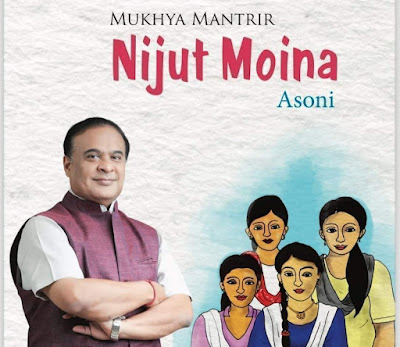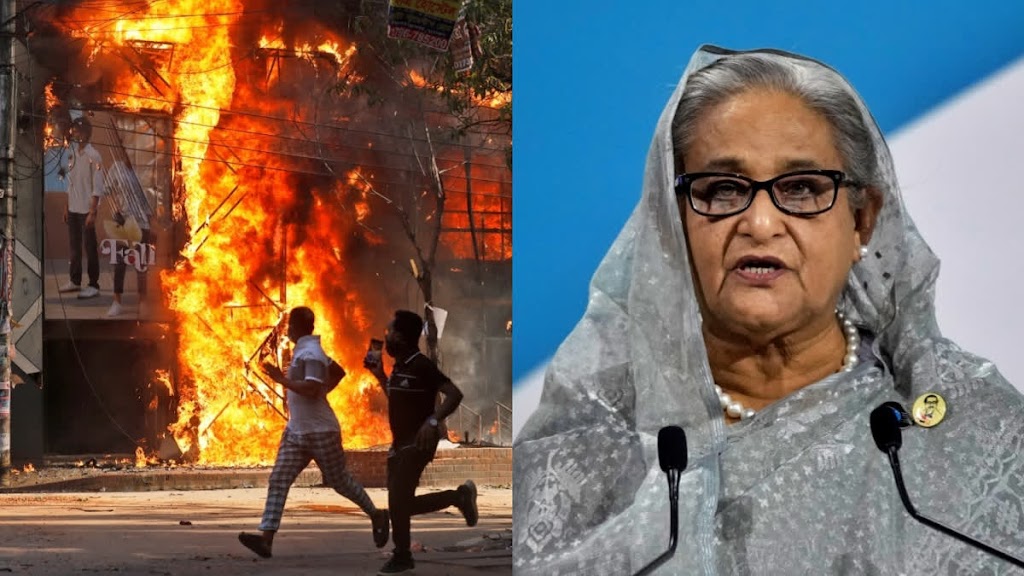Bangladesh Crisis 2024: Background, Causes, Loss and Challenges for APSC
In this article we have given the brief detail about Bangladesh Crisis 2024 : Background, Causes, Loss and Challenges. So, aspirants need to know the Bangladesh Crisis from international politics to prepare for the upcoming exams. A student can score full marks in international relation section if he/she is well versed with international relation. Here in this article, we are sharing the brief note on Bangladesh Protests for APSC Main exam.
Bangladesh Protests for APSC Mains : What are the Implications of the Political Upheaval?
The recent political turmoil in Bangladesh has led to significant unrest and the ousting of the government, primarily due to widespread protests against the existing job quota system. These protests, which have turned violent, began as a response to the 30% reservation in government jobs for families of those who fought in the 1971 war of independence.
Protesters argue that this system benefits supporters of Sheikh Hasina’s Awami League and should be replaced with a merit-based system.
Why are Students Protesting in Bangladesh?
The quota system was introduced in 1972 by Prime Minister Sheikh Mujibur Rahman, Sheikh Hasina’s father. Students started a protest against the quota system in October 2018, forcing the Bangladesh government under Sheikh Haseena to abolish all quotas.
However, the High Court of Bangladesh overturned that decision. This meant that 56% of government jobs were reserved for specific groups. This sparked the recent protests, with students questioning why benefits were being extended to the third generation of freedom fighters and demanding a merit-based recruitment system.
Caused for protest in Bangladesh ::
Reduction in Eligible Freedom Fighters: As time passed, the number of living freedom fighters who could benefit from the quota system naturally declined. This led to the underutilization of the quotas initially intended for them.
Generational Extension: Critics argue that it was fair to provide reservations to freedom fighters when they were young and seeking employment. However, extending these benefits to their children and grandchildren is contentious.
The rationale is that the original purpose of compensating the freedom fighters for their sacrifices is diluted when benefits are provided to subsequent generations who did not directly participate in the war.
Suspected Misuse: There are suspicions that shortfalls in the reserved seats meant for freedom fighters are being filled by party members of the ruling Awami League, led by Sheikh Hasina. This has raised concerns about the quotas being used for political patronage rather than the intended social justice.
Public Sentiment and Protests: The general public, particularly the youth and job seekers, have expressed dissatisfaction with the current state of the quota system. They argue that it creates an unfair advantage for certain groups and does not reflect the meritocratic principles needed for modern governance and employment practices.
Protests have been widespread, with demonstrators calling for a reform or abolition of the quota system to ensure fair competition and opportunities based on merit.
Government Response: In response to the protests, the government has occasionally promised reforms and reviews of the quota system. However, substantial changes have been slow to materialize, maintaining the tensions between the government and protesters.
Loss to India ::
The biggest loser is India’s Prime Minister Narendra Modi who has a longstanding and close personal relationship with Hasina that included shared leanings towards autocratic politics. Modi and the Indian security establishment have long relied on Hasina to keep Bangladesh stable and stave off the influence of the Islamists as well as regional rival China. With Hasina gone, Modi has now lost his closest ally in South Asia, underlining India’s declining influence among nearly all of its South Asian neighbours.
How does the Political Instability in Bangladesh Affect India?
Loss of a Trusted Ally: India has lost a key partner in Sheikh Hasina, who has been instrumental in countering terrorism and strengthening bilateral relations.
Hasina’s leadership enabled India to work closely with Bangladesh on security matters, a relationship now in jeopardy as political dynamics shift.
Western Scrutiny and Potential Backlash: India’s backing of Hasina has created friction with Western allies, specifically the US who have criticised her undemocratic practices. Balancing international relations while supporting a now-unpopular leader poses challenges for India.
With Hasina’s unpopularity growing, India may face backlash from Bangladeshi citizens who view India as an ally of the ousted leader. The situation could strain India-Bangladesh relations.
Challenges Lie Ahead for India in Engaging with a New Regime ::
Uncertain Political Environment: The nature of the new government, whether it is led by opposition parties or the military will significantly impact India’s strategic interests.
A new administration that is less friendly to India could re-energize anti-India militant groups, adding pressure to an already tense security situation along the borders.
Regional Geopolitics: The political instability in Bangladesh could provide an opportunity for China to expand its influence in the region.
India must be vigilant as Beijing might offer lucrative deals to the new regime, similar to how it has leveraged regime changes in Sri Lanka and the Maldives.
Impact on Indian Investments: Indian businesses and investments in Bangladesh might face uncertainties due to the political upheaval. Disruptions in trade and payment delays could impact the profitability and stability of these investments.
Around 25% of textile units in Bangladesh are owned by Indian companies. There is a likelihood that these units may shift their operations back to India due to the current instability.
Infrastructure and Connectivity Concerns: Infrastructure and connectivity have been vital in strengthening Indo-Bangladesh relations.
India has provided USD 8 billion in credit since 2016 for road, rail, and port projects, including the Akhaura-Agartala rail link and the Khulna-Mongla Port rail line.
However, current unrest threatens these crucial connections, potentially disrupting trade and access to India’s Northeast region, and jeopardising earlier agreements.
Balancing Act: India must strike a balance between supporting democratic forces and managing relationships with regional powers.
The challenge will be to avoid getting entangled in internal disputes while maintaining a robust diplomatic presence in Bangladesh.
Possible Strategic Actions for India ::
Diplomatic Engagement: India should engage diplomatically with all stakeholders in Bangladesh to promote a peaceful resolution to the political crisis. This includes supporting dialogues that lead to free and fair elections. High-level diplomatic visits and consultations can help reinforce India’s commitment to Bangladesh’s democratic process.
Economic Assistance: Providing economic assistance and support for developmental projects can help stabilize Bangladesh’s economy during the interim period. This can also strengthen India’s economic ties with Bangladesh.
Security Collaboration: Enhanced security cooperation to address any immediate threats arising from political instability is vital. Joint efforts in intelligence sharing and counter-terrorism can help manage any security fallout.
Regional Multilateral Forums: Utilizing regional forums like SAARC (South Asian Association for Regional Cooperation) and BIMSTEC (Bay of Bengal Initiative for Multi-Sectoral Technical and Economic Cooperation) to build a consensus on supporting Bangladesh’s democratic process and ensuring regional stability.
Conclusion ::
The protests over the quota system in Bangladesh stem from the perceived inequities and misuse of a system initially designed to honour and support those who sacrificed during the Liberation War.
The generational extension of benefits and alleged political misuse have fueled public dissatisfaction, highlighting the need for a comprehensive review and potential reform of the quota system to balance social justice with meritocratic principles.
The political upheaval in Bangladesh poses significant challenges and opportunities for India. By supporting democratic aspirations while maintaining strategic relationships, India can contribute to regional stability and promote its long-term strategic interests in South Asia. Balancing diplomatic, economic, and security initiatives will be crucial for India in navigating this complex political landscape.
Must Read :: Israel-Palestine Conflict
Now World_Polity is on every platform you can connect with us by just clicking the below social media links. Thank You.
Well if you like the article on Bangladesh Protests for APSC Mains : What are the Implications of the Political Upheaval, do comment & show your support by sharing it to the other aspirants and if there is any query you are welcome to ask.



